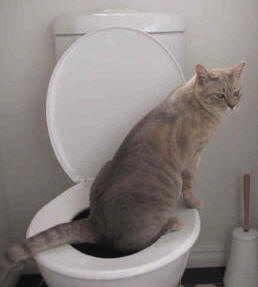Why Flushing Cat Poop Down Your Toilet Can Cause Problems - Tips for Safe Handling
Why Flushing Cat Poop Down Your Toilet Can Cause Problems - Tips for Safe Handling
Blog Article
What are your opinions with regards to Can You Flush Cat Poop Down The Toilet??

Introduction
As feline owners, it's vital to be mindful of how we take care of our feline buddies' waste. While it may seem convenient to flush cat poop down the toilet, this practice can have destructive repercussions for both the atmosphere and human health and wellness.
Alternatives to Flushing
Luckily, there are much safer and much more liable ways to dispose of feline poop. Take into consideration the complying with alternatives:
1. Scoop and Dispose in Trash
One of the most typical approach of dealing with pet cat poop is to scoop it into an eco-friendly bag and toss it in the trash. Be sure to use a dedicated litter inside story and throw away the waste quickly.
2. Usage Biodegradable Litter
Opt for biodegradable pet cat clutter made from products such as corn or wheat. These litters are eco-friendly and can be securely thrown away in the trash.
3. Bury in the Yard
If you have a lawn, take into consideration hiding cat waste in a designated area away from veggie yards and water resources. Make certain to dig deep enough to prevent contamination of groundwater.
4. Install a Pet Waste Disposal System
Invest in a family pet garbage disposal system particularly created for feline waste. These systems utilize enzymes to break down the waste, decreasing odor and environmental influence.
Health and wellness Risks
In addition to environmental worries, purging pet cat waste can also pose wellness dangers to human beings. Pet cat feces may contain Toxoplasma gondii, a bloodsucker that can trigger toxoplasmosis-- a possibly serious disease, particularly for expectant ladies and individuals with weakened body immune systems.
Ecological Impact
Flushing pet cat poop introduces hazardous virus and parasites right into the water, posturing a significant danger to marine communities. These impurities can negatively impact marine life and concession water top quality.
Conclusion
Responsible animal possession expands past giving food and sanctuary-- it additionally involves proper waste management. By avoiding flushing cat poop down the toilet and selecting different disposal techniques, we can reduce our environmental footprint and protect human health.
Why You Should Never Flush Cat Poop Down the Toilet
A rose by any other name might smell as sweet, but not all poop is created equal. Toilets, and our sewage systems, are designed for human excrement, not animal waste. It might seem like it couldn’t hurt to toss cat feces into the loo, but it’s not a good idea to flush cat poop in the toilet.
First and foremost, assuming your cat uses a litter box, any waste is going to have litter on it. And even the smallest amount of litter can wreak havoc on plumbing.
Over time, small amounts build up, filling up your septic system. Most litter sold today is clumping; it is made from a type of clay that hardens when it gets wet. Ever tried to scrape old clumps from the bottom of a litter box? You know just how cement-hard it can get!
Now imagine just a small clump of that stuck in your pipes. A simple de-clogger like Drano isn’t going to cut it. And that means it’s going to cost you big time to fix it.
Parasitic Contamination
Believe it or not, your healthy kitty may be harboring a nasty parasite. Only cats excrete Toxoplasma in their feces. Yet it rarely causes serious health issues in the cats that are infected. Most people will be fine too if infected. Only pregnant women and people with compromised immune systems are at risk. (If you’ve ever heard how women who are expecting are excused from litter cleaning duty, Toxoplasma is why.)
But other animals may have a problem if infected with the parasite. And human water treatment systems aren’t designed to handle it. As a result, the systems don’t remove the parasite before discharging wastewater into local waterways. Fish, shellfish, and other marine life — otters in particular — are susceptible to toxoplasma. If exposed, most will end up with brain damage and many will die.
Depending on the species of fish, they may end up on someone’s fish hook and, ultimately on someone’s dinner plate. If that someone has a chronic illness, they’re at risk.
Skip the Toilet Training
We know there are folks out there who like to toilet train their cats. And we give them props, it takes a lot of work. But thanks to the toxoplasma, it’s not a good idea.

I'm certainly very fascinated by How to Dispose of Cat Poop and Litter Without Plastic Bags and I hope you liked the new blog entry. Enjoyed our write-up? Please share it. Help somebody else locate it. Thanks for your time. Please stop by our site back soon.
Need Help? Hire Us Now! Report this page